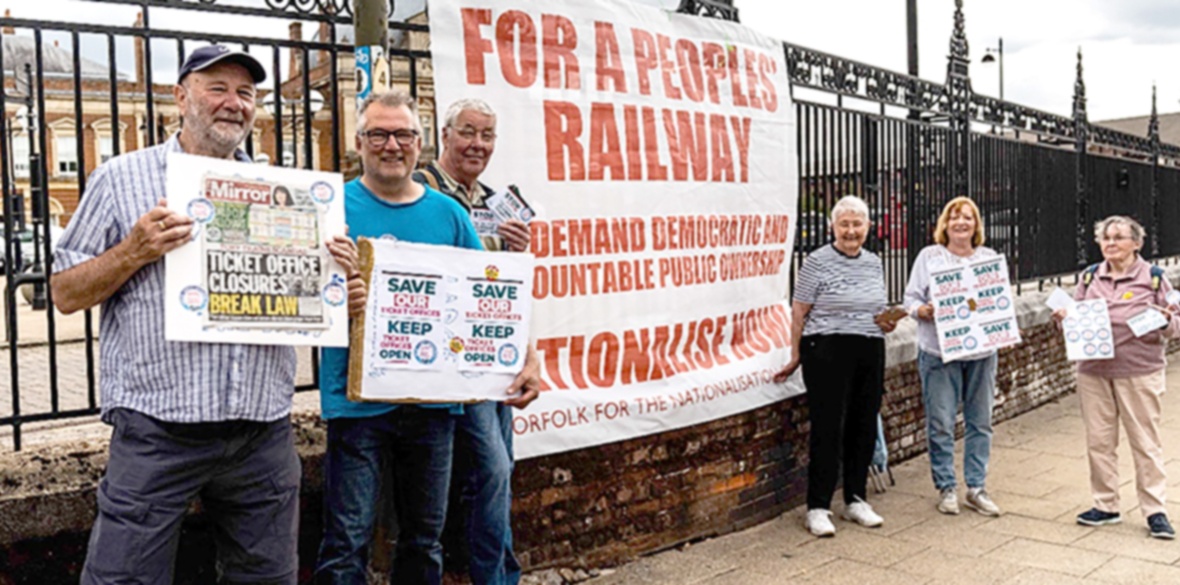This is the last article you can read this month
You can read more article this month
You can read more articles this month
Sorry your limit is up for this month
Reset on:
Please help support the Morning Star by subscribing here
THE current rail strikes have once again brought the question of rail nationalisation to the forefront.
After all, the RMT has for many years been defending the idea of the social railway as distinct from the profit-centred (privatised) system we have endured for nearly 30 years.
This fight for renewal has been focused on keeping the guard on the train and now the retention of ticket offices — both struggles are about having a human presence on rail, particularly in relation to disability and mobility, adding another factor in “transport poverty.”
This current industrial action is the most prolonged in the history of the RMT. The syndicalist NUR (RMT’s predecessor) was born from the insurrectionary strikes of 1910-11 that stunned the rail companies and led to union recognition.
Today’s action is a fight for the survival of the rail industry’s collective bargaining system but it has proved beyond doubt that privatisation has completely failed to destroy the unions.
Even the destruction of the machinery of negotiation that regulated the nationalised industrial relation fabric for nearly 50 years did not diminish union membership.
This was largely due to the rebuilding of the RMT under Bob Crow which took on the organising model. For Aslef this is a struggle against the micro-management and surveillance that threatens the autonomy of drivers.
Rail public ownership is now about much more than bringing back the British Rail sandwich although this much-maligned culinary creation would certainly win Master Chef.
As Mimi Sheller has argued: “Our old ways of planning transport and doing transport studies are certainly in need of updating,” therefore rail nationalisation would be only the start of the changes that are needed.
We need to consider the following.
Railways were born with fossil fuel capitalism and are still been shaped by the needs of multinational capital. But they can play a key role in building an eco-socialist future in relation to the climate crisis in so much as flooding, landslides and soil erosion, not to mention the longer term effects of rising sea levels, will dramatically reconfigure rail systems.
Rail accidents in Scotland, Greece, India and the US and flooding in central Spain including part of the Madrid Metro, have highlighted just how vulnerable railways are to climate events. This suggests that the European dimension of railways is important for two reasons.
First, because EU-directed privatisation is weakening public ownership in Europe and rail unions like the CGT are fighting back and, second, rail workers have a history of autonomous action to run railways themselves as in Russia in 1917-18 and Catalonia in 1936.
Disability has not been sufficiently addressed in terms of rail travel. Only with massive protests and legislation have we edged closer to a railway that places disabled people on equal terms.
Historically, “invalid carriages” were temporarily introduced on some of Britain’s trains in the 1860s and 1870s but only for the wealthy.
Despite the huge number of disabled veterans after WWI (including those with shell-shock), no official policies were adopted by the railway companies to allow for wheelchair travel.
Until very recently, many disabled people faced railway apartheid as the only access they had to trains was in the guard’s van, and this relied on rail workers to become unofficial transport intermediaries.
This apartheid was reinforced by the creation of class distinctions in the early days — first, second, third and fourth class travel that at no time included the needs of disabled passengers.
Rail workers are a critical force in creating a new system. Light rail/ trams and road/rail vehicles will replace car use which results in 1.3 million deaths a year globally.
A slow railway on the lines of the community-based system just opened on the Yucatan peninsula in Mexico will require a new generation of station stops.
Rail unions in alliance with communities as shown by NOR4NOR in Norfolk will be required and the work of the GLC’s Popular Planning Unit in building an autonomous current on London’s Tubes and buses can serve as a starting point.
This dovetails with the renewal of regional devolved transport such as the new municipally owned bus service in Manchester.
To conclude, the strike movement will leave a legacy that won’t melt away. A whole layer of battle-hardened militants has emerged on picket lines and those same picket lines have been joined by thousands of local community activists and other union members.
The opportunity to build an alliance between the unions and communities at local and regional levels that can become a movement for a new form of public ownership is on the agenda.
We have to create a model of public transport that is neither that of the capitalist market nor of Soviet-style command economies. It is a model that has been latent in the struggles of rail workers from the end of the 19th century when public ownership was first taken up as a pathway to socialism and railways remain central to socialist transformation.
Dave Welsh is convenor of NOR4NOR and a retired RMT member.








